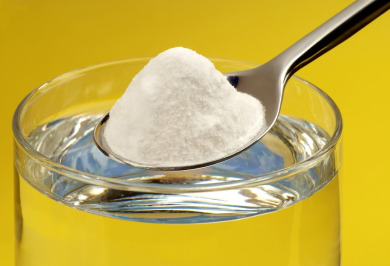 New Health Guide
New Health Guide
Gout is basically a type of arthritis that affects the feet and the hands. The condition is a result of accumulation of uric acid crystals within the joints. These crystals start to form in the body when the pH is too low (acidic), a condition referred to as acidosis.
Currently, there are various home remedies that may be used to cure the condition, including baking soda for gout. The effectiveness of baking soda in curing this condition may be attributed to its ability to raise the pH of body fluids. In some cases, patients have reported relief from gout in less than 24 hours after using this remedy.

In addition to being an effective antacid, baking soda may also be used to relieve heartburn and acid indigestions. This is mainly because of the high sodium content in the gout baking soda. Once introduced into the body, baking soda lowers the uric acid levels, hence reducing the accumulation of uric acid crystals in the joints. This in turn minimizes the pain associated with gout.
Once in the blood stream, the baking soda raises the pH of the blood by removing ions of hydrogen. This increases the capacity of blood to hold uric acid and prevents its crystallization and deposition in the joints. Baking soda should first be mixed with water before consumption.
Baking soda is commonly available in powder form. However, you may also use the tablet. The remedy should be taken according to the prescribed dosage, which is determined by the seriousness of the gout.
To make the solution, you should dissolve half a teaspoonful of baking soda into about 250ml of water. The remedy should then be taken 4 times in a day, with a glass of it being taken right before going to bed and one after waking up. The other two glasses of the baking soda solution should be taken during the day, preferably an hour before or after meals. Basically, the body becomes more acidic during the night. As such, a glass of the solution should be taken before going to sleep.
Yes, it will.
Intake of large amounts of baking soda is not advisable, because the remedy is rich in sodium. Additionally, you should also minimize the use of salt in your food while taking the remedy. On average, a teaspoon of baking soda contains about 1200mg of sodium. Excessive intake of sodium can have adverse effects on the body. Being a caustic poison, excess sodium in the body can lead to burns on the esophagus and the mouth. Additionally, it can also cause the stomach to rapture. Continued intake of sodium may also lead to alkalosis. In other cases, overuse of baking soda can also lead to upset stomach, high blood pressure and appetite loss. Other side effects of this remedy are:
Gout attacks have also been proven to be induced by stressful occurrences. Therefore, it is highly advisable for gout patients to work on minimizing their stress levels while taking baking soda to further enhance the effectiveness of baking soda for gout. As such, you should couple intake of this remedy with stress relieving techniques, such as meditation and deep breathing. Additionally, it is also advisable to increase the intake of foods that are low in animal protein, fat and high in plant-based foods as well as complex carbohydrates. If you are taking baking soda for gout remedy, you should as well stay away from alcohol.
Although baking soda is a home remedy, it is vital that you see a health practitioner before using the remedy. The professional will determine the suited prescription for you based on the seriousness of the condition. Additionally, he or she will also elaborate any contraindications that may be experienced while using this remedy. Baking soda for gout is not suitable for people suffering from blood pressure because baking soda raises blood pressure as well as the salt content in the blood.